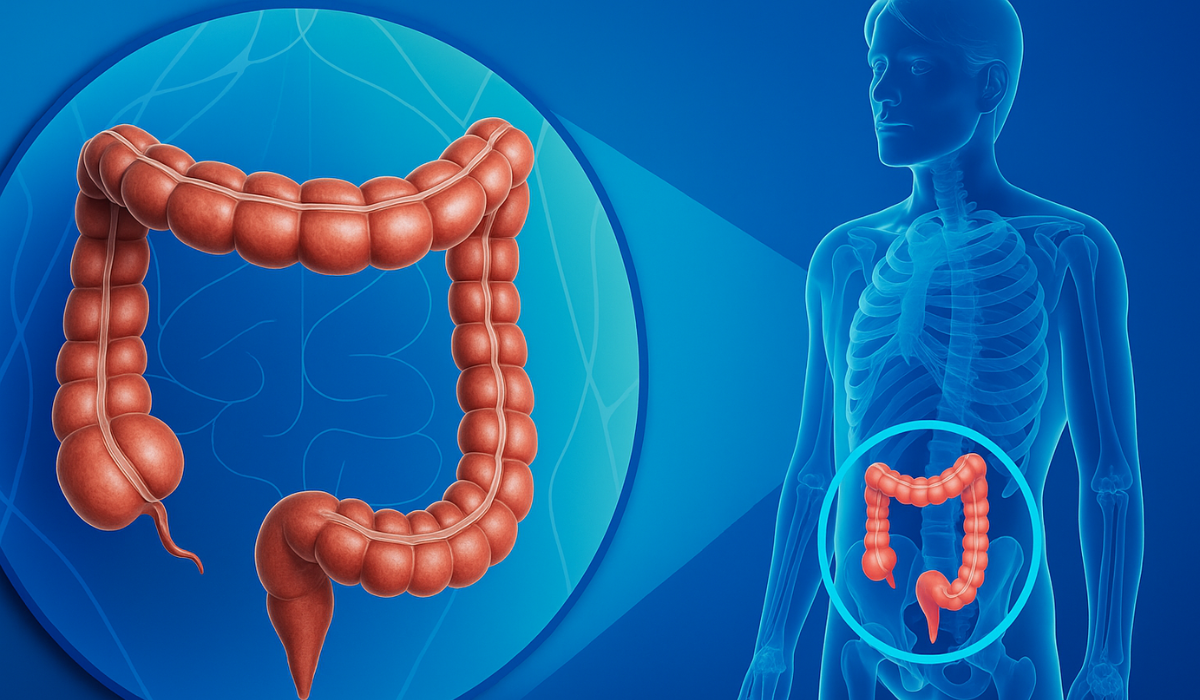Digestive health issues can be confusing, and perhaps one of the most ambiguous parts is the distinction between colorectal cancer vs IBS. Both of these diseases can have very similar symptoms, but they have very distinct implications for your health.
Colorectal cancer is a serious, in some cases deadly, illness, while IBS (irritable bowel syndrome) is a chronic illness that impacts daily functioning but is not deadly.
Colorectal cancer vs IBS is facilitated by an understanding of when to consult a doctor due to symptoms.
What Is Colorectal Cancer? Causes and Risk Factors
Colorectal cancer is the outcome of uncontrolled cell growth in the rectum or colon. Colorectal cancer vs IBS begins with the understanding that with early-stage colorectal cancer, no symptoms will ever be present at all, but IBS will have clear-cut symptoms right from the beginning.
Risk factors for colorectal cancer include:
- Age over 50 years
- History of family cancer of the rectum or colon
- Low dietary fiber and high processed food consumption
- Physical inactivity
- Smoking and alcohol consumption
The American Cancer Society estimates 153,000 new cases of colorectal cancer each year in the United States, so early detection is very critical.
What Is IBS? Causes and Triggers
Comparing colorectal cancer vs IBS, consider that IBS is a functional bowel disorder, or the gut appears normal but does not function normally.
Common IBS triggers:
- Stress and stress/anxiety
- Food such as dairy, caffeine, and high-FODMAP foods
- Gut infections
- Hormonal changes
While IBS can affect as much as 15% of all individuals on the planet, it never causes permanent damage to the intestines, as does colorectal cancer.
Key Symptom Differences Between Colorectal Cancer vs IBS
IBS and colorectal cancer have different warning indicators, even though both conditions present with the same digestive symptoms.
| Symptom | Colorectal Cancer | IBS |
| Blood in stool | Common | Rare |
| Weight loss | Unexplained and significant | Rare |
| Abdominal pain | Persistent and worsening | Comes and goes, relieved by bowel movements |
| Bowel habit changes | Lasting several weeks | Fluctuates daily |
The main difference between colorectal cancer vs IBS is that cancer symptoms tend to get worse over time, whereas IBS symptoms are variable and more diet and stress-related.
Overlapping Symptoms in Colorectal Cancer vs IBS

In comparing colorectal cancer and IBS, note that bloating, cramps, and bowel change symptoms overlap, but worsening or repeated symptoms are suspicious of colorectal cancer.
Recurring changes in symptoms that worsen with diet change or stress management are common IBS symptoms.
A delayed diagnosis and course of therapy could arise from failing to recognize the subtle differences between colorectal cancer and IBS.
Diagnosis: How Doctors Distinguish Colorectal Cancer vs IBS
To distinguish between colorectal cancer and IBS, doctors use a variety of methods.
Colorectal Cancer Diagnosis:
- Colonoscopy with biopsy
- CT scans and imaging
- Stool occult blood test
IBS Diagnosis:
- According to symptom criteria (Rome IV)
- Exclusion of other illnesses
- Simple stool and blood investigations to exclude red flags
The doctor’s knowledge of the extent of symptoms can help them rapidly differentiate colorectal cancer and IBS and order the correct tests.
When to See a Doctor: Warning Signs in Colorectal Cancer vs IBS
Immediately consult a healthcare professional if you observe any of these:
- Bright red or very dark-colored stool with blood
- Unintended weight loss
- Stomach pain that persists near
- Anemia (red cell deficiency)
- Substantial changes in bowel habits over a few weeks
Delays in action when colorectal cancer vs IBS symptoms arise can decrease your likelihood of getting early treatment.
Treatment Approaches for Colorectal Cancer vs IBS
Understanding treatment options for colorectal cancer vs IBS shows how different these two conditions are.
Colorectal Cancer Treatment:
- Surgical removal of the tumor
- Chemotherapy and radiation
- Immunotherapy in advanced disease
- Targeted therapy for genetic mutations
IBS Treatment:
- Dietary change, in the form of a low-FODMAP diet
- Probiotics and fiber supplements
- Antispasmodic or anti-diarrheal medication
- Cognitive Behavioral Therapy (CBT) for stress-related symptoms
In colorectal cancer and IBS, the former requires life-saving measures while the latter can be relieved by lifestyle change.
Prevention Tips for Colorectal Cancer vs IBS
You can reduce your chances of both with healthy behaviors.
For Colorectal Cancer:
- Have regular screening at age 45 and older
- Maintain a healthy weight
- Eat more fruits, veggies, and whole grains
- Red meat and processed foods, eat less of
- Smoke less tobacco and less alcohol
For IBS:
- Discover food trigger avoidance
- Control stress by relaxation methods
- Keep moving for healthy digestion
While colorectal cancer and IBS have separate origins, staying vigilant about gut health benefits both.
Conclusion
Understanding the difference between IBS and colorectal cancer can save lives. Despite being uncomfortable, BS is a chronic condition that may be managed. Colorectal cancer, untreated, kills.
If you experience strange or chronic digestive discomfort, don’t assume it’s nothing—test yourself. In the fight between colorectal cancer and IBS, early treatment and intervention will be the winners. Always maintain good health practices and heed your body’s warning signals.
FAQ’s
How can I tell if my symptoms are colorectal cancer or IBS?
If your symptoms persist, worsen, or are accompanied by the presence of blood in the stool or unintended weight loss, it is essential to see a doctor immediately.
Is a colonoscopy necessary for diagnosing IBS?
No, colonoscopy is normally reserved to exclude severe disease like colorectal cancer, but it is not needed solely to make the diagnosis of IBS.
Does having IBS increase the risk of colorectal cancer?
No, IBS is not a cause of colorectal cancer. But if new severe symptoms are ignored, the diagnosis for other diseases will be delayed.
What is the biggest warning sign between colorectal cancer vs IBS?
Unreasonable weight loss and unexplained rectal bleeding are more serious indicators of colorectal cancer.






